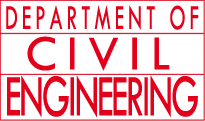The Programme aims to provide quality education and training in civil engineering for professional practices with the following emphases:
- To train students to become all-rounded professional civil engineers who are able to compete effectively in the modern society with rapid technological changes, and to become leading professionals both in the industry, and in academic or government institutions.
- To educate students to become civil engineers for designing, building and managing building and structural systems, supporting and enhancing economic developments and creating a better quality of life.
- To contribute to the developments and maintenance of infrastructural facilities and systems, especially in the local and neighbouring regions.
- To develop students’ engineering problem-solving skills using the latest technologies.
- To equip students with knowledge of sustainable developments for the improvement of the living environment and the preservation of the natural environment.
- To understand ethical issues associated with their profession, and be able to apply their acquired knowledge and skills to the betterment of society.
- To prepare graduates for future professional career developments or pursuing their postgraduate studies in engineering.
Programme Objectives
On completion of the four-year programme, our students should have attained the following learning outcomes:
- Acquire knowledge in mathematics and science for applying to civil engineering practices.
- Design and conduct experiments, as well as to analyse and interpret data relevant to civil engineering disciplines.
- Design a system, component or process to meet desired needs within realistic constraints, such as economic, environmental, social, political, ethical, health and safety, manufacturability and sustainability.
- Function in multi-disciplinary civil engineering teams.
- Identify, formulate and solve civil engineering problems.
- Understand the importance of professional and ethical responsibilities.
- Communicate and present ideas effectively, including technical writing, oral and presentation skills.
- Understand the impact of civil engineering solutions in a global and societal context, especially the importance of health, safety and environmental consideration to both workers and the general public.
- Stay abreast of contemporary issues, and the awareness of the engineering impacts
- Recognize the need for, and to engage in life-long learning.
- Use the techniques, skills, and modern engineering tools necessary for the civil engineering practices.
- Use the computer/IT tools relevant to the civil engineering disciplines along with an understanding of their processes and limitations.

